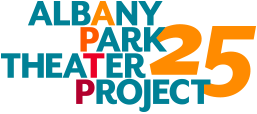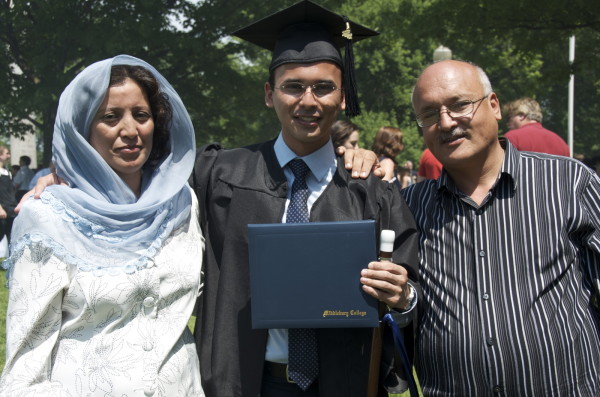When APTP decided to start college counseling, we committed to building a program as holistic, rigorous, and successful as any in the country – and as loving as everything we do at APTP.
70% of APTP youth graduate college by the age of 25. That’s more than 7 times the national college graduation rate for low-income students. Our goal is an 80% college graduation rate by 2018, which will mean our APTP teens are graduating college at the same rate as the wealthiest, best-resourced students in the country. Here’s a look at APTP’s College Access & Success program.
CULTURE. APTP envelopes students in a culture that promotes college success from their first days with us. Since most teens arrive at APTP at the beginning of high school, that gives them four full years in an environment where they come to believe college is a real possibility.
We surround young people with examples of APTP alumni who have achieved college success from their same schools and neighborhoods. Our walls are decorated with photos of APTPians on their college campuses and at their graduations – including a map showing the 15 colleges from California to Vermont where APTPians are currently studying. Maggie Popadiak, one of our earliest alums to graduate college, is now APTP’s associate director and a leader of our college program. Other alums visit frequently, and talk with new generations of APTPians about their college experience.
ACCESS. Early campus visits make college tangible for our teens, many of whom have never set foot on a college campus. Visiting campuses where APTP alums are students helps our youth envision belonging at colleges away from home and where students are predominantly white and upper-income. Visits also help students who have negative connotations with school identify the differences between high school and college and see continuing their education as exciting. For many, the tangible promise of college becomes the inspiration to stay in high school.
We take our high school sophomores on at least one visit to a selective college where APTP has a strong relationship. They are hosted by an APTP alum, have a campus tour, eat in a dining hall, have a Liberal Arts 101 seminar with professors, and do homework in a college library. For our juniors, visits include overnight stays in dorms and attending classes.
The past two years, APTP has been invited to perform at colleges attended by our alumni. Many of our teen ensemble members now have their first college experience as visiting artists, applauded for their performances and welcomed as honored guests. That’s an especially empowering way for a young person to have their first-ever college experience! (Read about recent performances at Kalamazoo College and College of Wooster.)
ACADEMIC PREPARATION. APTP encourages and supports academic success throughout high school to prepare as many students as possible for admission to selective colleges with the highest graduation rates. APTP staff meet with each ensemble member to review every school progress report (8 per year), set goals, and make individualized work plans for how students will achieve those goals. Our academic tutor, Brett Schneider, holds drop-in tutoring sessions twice a week after APTP rehearsals. Teens can also text Brett to arrange unlimited one-on-one tutoring. (Read more about APTP’s tutoring program.) Because we see teens 2-6 days a week for theater workshops and rehearsals, we can regularly encourage and monitor their progress toward the academic goals they’ve set – and revise plans with them as frequently as necessary.
NON-COGNITIVE PREPARATION. The core activity at APTP – creating original theater that explores contemporary issues and is based on interviews and research – intrinsically develops and exercises key skills and traits that contribute to academic persistence.
APTP nurtures all four of the “mindsets” that the Consortium on Chicago School Research has determined dramatically increase academic perseverance:
“When students feel a sense of belonging in an academic community” At APTP, teens undertake long-term projects that are analytical, interpretive, and creative, and with the world around them as their research site. This is exactly the kind of experiential, cross-disciplinary learning championed by liberal arts colleges – which is why our alumni find themselves on familiar ground in interdisciplinary college seminars and social science departments.
“When students believe that they can increase their academic ability by their own effort” In the year-long process of devising and rehearsing a play to exacting standards, teens without previous experience master complex acting, choreography, and staging. They feel their ability growing constantly. They also learn to assess, revise, and reflect in an arena where there are no right answers, developing the ability to determine when their work can be improved and when it meets with their own approval.
“When they believe that success is possible and within their control” APTP youth experience high-stakes, real-world success when they perform the plays they devise before thousands of audience members in professional venues. Because teens have participated in the entire creative process – conducting the interviews that inspired the play, researching and coming to consensus around complex issues, and devising the script and staging – they understand their achievement as an intellectual as well as aesthetic success.
“When they see work as interesting or relevant to their lives” Making theater that is civically engaged, teens at APTP identify themselves as activists as much as artists. They develop a strong sense of purpose over their 4-6 years with us, and they embark on college with a sense of mission: higher education for them is about both personal fulfillment and making the world a better place – and they seek colleges and programs that support that vision.
MATCH. The cornerstone of our college program has always been matching students with colleges where they have the greatest likelihood of satisfaction and success. Beginning the spring of junior year, youth have weekly college counseling meetings with a staff member who has known and worked with them closely their entire time at APTP. Through researching and discussing prospective schools with their APTP college counselors, students come to define what they want from a college. They make campus visits throughout this process, underwritten by the colleges or APTP.
APTP has long encouraged its students to choose the most selective schools to which they can gain admission – even when those schools may feel counter-intuitive to students or families due to distance from home, fears of not measuring up, relative lack of diversity, or “sticker price.” This is now considered a best practice for first-generation college students, informed by research that shows the more selective a college they choose, the higher their likelihood of graduating.
APPLICATION. APTP staff guide students as they complete the application and financial aid process, write personal statements, and submit application materials. Writing the college application essay is a rite of passage for APTPians. Our seniors practically live together between Christmas and New Year’s, writing almost round the clock, turning the home of APTP staff David Feiner and Maggie Popadiak into a makeshift college dorm. For many, these essays are more than an opportunity to tell their stories to admissions offices: they are often the most rigorous writing experiences they have undertaken to date, and they become mission statements that fuel them as they embark on the new challenge of college.
FINANCING. APTP counsels students and families not only through applying for financial aid but on which financial aid packages are viable for the student/family. APTP students go to college understanding their aid package and their loan responsibility. APTP makes last dollar grants to a small number of students so they can afford to attend a match college. APTP has developed particular expertise in guiding students who are undocumented or have undocumented parents.
SUCCESS. The long-term, intimate nature of the relationships that APTP develops with youth translate to continued communication and support throughout college, with APTP staff serving as college coaches. This can include everything from guidance in seeking support services on campus, to advising on course selection, to reassurance and reminders of past success, to counseling regarding money management, problems with roommates, and shifting relationships with family. During the first semester of college, APTP communicates with each student at least once every two weeks – by text, social media, email, Skype (and occasionally an old-fashioned phone call). After the first semester, we communicate as often as necessary – but at least monthly through the first two years of college. At the suggestion of alumni, APTP has also started to host organized gatherings of our college students so that they can offer one another peer support.
Albany Park Theater Project didn’t start out with a college access and success mission. When our co-founder, Laura Wiley, realized that making theater with a social justice mission was nurturing an extraordinarily high level of ambition and ability in our teens, she committed to building a college program as holistic, rigorous, and successful as any in the country – and as loving as everything we do at APTP. Today, national research confirms as best practices the philosophy and practices that have been central to our program since Laura started it 15 years ago. Most importantly, our many first-generation college graduates are proof of our program’s success – and continue to make it ever stronger through their suggestions and the mentorship they give to new generations of APTPians.
 Menu
Menu
